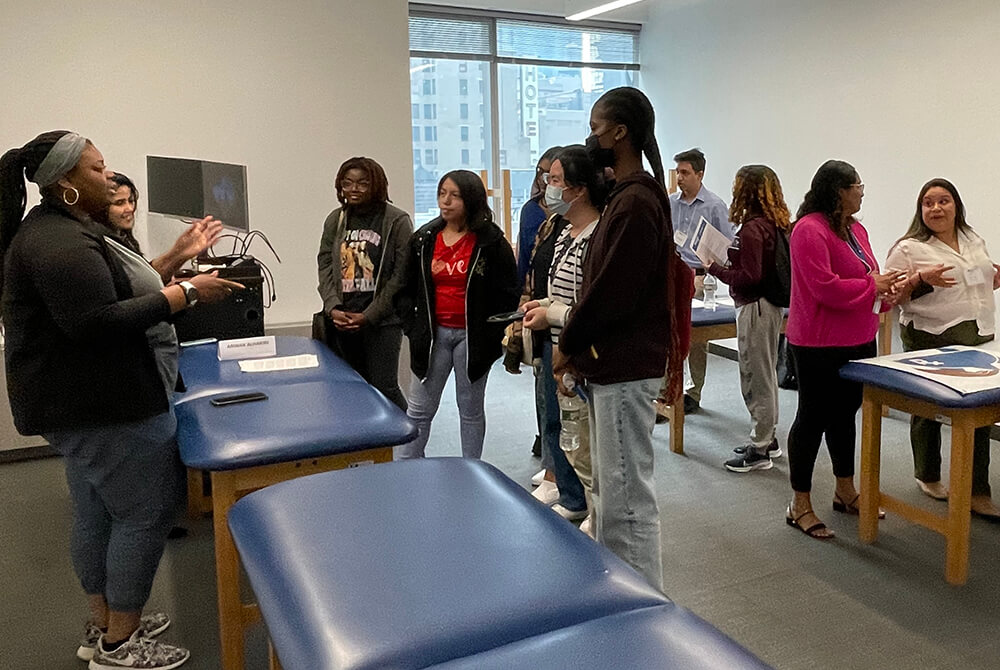News
Boot Camp Bridges the Gap in Pharmacy Education
Touro College of Pharmacy's Center for Excellence Hosts Underrepresented College Students for Three-Day Pharmacy Boot Camp Thanks to $3 Million HRSA Grant

In June, 19 first and second-year college students from the Tri-State area descended upon Touro College of Pharmacy’s (TCOP) new Times Square campus, where they played a pharmacy version of “Jeopardy,” answering questions about using over-the-counter pharmaceutical products. They also made medicated dog biscuits in the lab; learned how to check blood pressure and sugar levels; and how public health professionals design education and prevention programs by researching the health of local communities using “virtual” data.
It was all part of a three-day summer camp organized to increase awareness of the pharmacy profession and the work that pharmacists do among college students who have expressed interest in the field. The “campers”—about half of whom were underrepresented minorities (URM)—also had a give-and-take with faculty, current students and alumni. When it was all over, many also went home CPR-certified.
“The students were very happy and excited to have engaged in active learning-based programs,” said Associate Dean of Assessment and Associate Professor Dr. Bupendra Shah. “Every day had a theme. We wanted to give them a 360-degree exposure to what they can expect to learn in pharmacy school and the many career options available to pharmacists.”
$3 Million Government Grant
The Pharmacy Summer Boot Camp for College Students is but one initiative TCOP is diving into as part of a newly established Center of Excellence for Pharmacy Education and Pharmacist Care Services. The Center also aims to provide training and research opportunities for faculty and students to address minority health issues and social determinants of health impacting underserved communities in New York City.
The Center is supported by a five-year $3 million grant from the federal Health Resources and Services Administration to increase the numbers of underrepresented minorities in pharmacy.
“We are honored to be chosen for this grant,” said TCOP Dean Cohen. “The Center’s goal is to leverage the growing role of pharmacists in patient care by enhancing the diversity of pharmacists, expanding access to culturally sensitive care, and improving patient outcomes - especially with chronic diseases like asthma and hypertension, which disproportionately affect minority communities.”
Nationally, Black/African American and Hispanic students are underrepresented in pharmacy programs, according to data from the American Association of Colleges of Pharmacy. In fall 2020, URM accounted for 18.2 percent of pharmacy students nationwide, which does not come close to matching the racial and ethnic/cultural diversity found in the city’s five boroughs.
"Scholars" Program Key Part of Strategy
A major part of the Center is a “Scholars” program for URM applicants. Once an applicant is admitted to TCOP, they are eligible for a one-year scholarship from the Center in the form of a tuition remission and expenses that can be used for educational needs.
In the 2022-23 academic year, the school helped support 20 Scholars and expects to support about the same number in the 2023-24 academic year, Dr. Shah said.
Other recent Center activities have included a Faculty Speaker Series for the TCOP community and the hiring of a teaching and learning specialist to strengthen academic advising, peer tutoring and address other challenges and needs at TCOP.
Barriers to pharmacy enrollment are also addressed through linkage agreements with undergraduate colleges that allow qualified URM applicants to complete their PharmD education at TCOP a year earlier than usual. Linkage agreements already exist between TCOP and 11 institutions of higher education in the tristate area including four City University of New York (CUNY) colleges: Lehman College, Brooklyn College, Hunter College and Medgar Evers College. Most of the 11 schools have significant URM enrollment. On average, 25 percent of students recruited from TCOP’s linked schools have been Hispanic and 20 percent have been African American and most of the URM students have come from a CUNY system school. Going forward, the Center plans to increase recruitment efforts of URM students from the existing linked schools as well as to add new partnering schools.
As they progress through the TCOP curriculum, URM students receive their clinical training in community-based healthcare settings throughout NYC to address both minority health issues and social determinants of health. These include The Mount Sinai Health System, St. Barnabas Hospital and Health System and Bronx Health Care Network. New partnerships with hospitals and other community-based organizations are planned.
“As the only four-year Doctor of Pharmacy (PharmD) program in Manhattan, which is home to many healthcare facilities, community organizations, and a rich and diverse culture, TCOP is well-positioned to serve NYC,” noted Dr. Shah. “The Center will enhance the pharmacy workforce pipeline with racially diverse, culturally competent pharmacists.”

